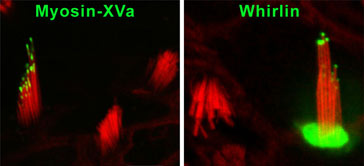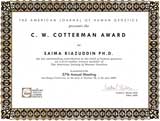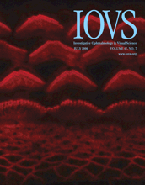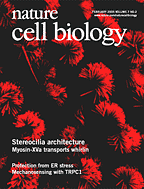|

Thomas B. Friedman, Ph.D.
Chief
Laboratory of Molecular Genetics
Chief
Section on Human Genetics
Laboratory of Molecular Genetics
NIDCD/NIH
5 Research Court, Room 2A01
Rockville, MD 20850
Phone: (301) 496-7882
Fax: (301) 402-7580
E-mail: friedman@nidcd.nih.gov
Dr. Friedman received a B.S. and his Ph.D. from the University of Michigan where he worked with Tahir Mohammed Rizki on the molecular genetics of purine metabolism in Drosophila. After postdoctoral work at the NIMH, he became a faculty member in the Department of Zoology and the Department of Pediatrics and Human Development at Michigan State University. For five years he was also the Director of the Interdepartmental Graduate Program in Genetics. In 1996, he joined NIDCD as the Chief, Laboratory of Molecular Genetics. Dr. Friedman's Section on Human Genetics at the NIDCD studies hereditary hearing loss and Usher Syndrome in humans and mouse models. Dr. Friedman helped to create the NIH's Usher Syndrome Web site, a joint resource from NIDCD and the National Eye Institute.
On this page:
Laboratory of Molecular Genetics
Research Statement
The goal of the Laboratory of Molecular Genetics is to identify, clone and characterize the genes that contribute to communication disorders. The Laboratory of Molecular Genetics has three sections, the Section on Human Genetics, the Section on Gene Structure and Function, and the Section on Systems Biology of Communication Disorders. The Section on Human Genetics is studying the genes responsible for hereditary hearing impairment and hearing loss coupled with progressive loss of vision (Usher syndrome). Improved understanding of the mutated genes will provide important information on hearing and brain processing. The identification of the relevant genes will also permit early and more accurate diagnosis for certain forms of hereditary hearing and communication impairments as well as loss of sight.
Additional research information about the identification and location of the genes for nonsyndromic and syndromic hereditary hearing loss can be found on the Hereditary Hearing Loss home page.
Subjects Needed for Research Studies
At the Laboratory of Molecular Genetics, investigators are seeking research subjects from families to participate in research studies in the following areas:
Top
Section on Human Genetics

Restoration of the elongation and staircase organization of abnormally short hair cell stereocilia bundles in myosin XVa mutant mice (shaker 2) and whirlin mutant mice after gene gun mediated transfection of wild-type GFP-myosin XVa and GFP-whirlin, respectively (Belyantseva et al., 2005)
View Larger Image Staff of the Section on Human Genetics identify and characterize dominant and recessive mutations which cause hereditary hearing impairment and Usher syndrome (hearing loss and retinal degeneration). Families from the United States, Pakistan, and India are being studied to identify mutated genes that cause hereditary hearing impairment.
Lab Personnel
Inna A Belyantseva, M.D., Ph.D, Research Fellow, 301-435-8204 (Send e-mail)
Jonathan Bird, Ph.D., Postdoc Fellow (Visiting Fellow), 301-402-8038 (Send e-mail)
Erich T Boger, B.S., Senior Research Assistant, 301-435-8110 (Send e-mail)
Zubair M Ahmed, Ph.D., Research Fellow, 301-402-4209 (Send e-mail)
Shin-Hyung Ahn, B.S., Post Baccalaureate IRTA, 301-402-4205 (Send e-mail)
Dhananjay R Chhatre, B.S, Post Baccalaureate IRTA, 301-402-4208(Send e-mail)
Byung Yoon Choi, M.D., Ph.D, Postdoc Fellow (Visiting Fellow), 301-402-4205 (Send e-mail)
Shin-Ichiro Kitajiri, M.D., Ph.D., Postdoc Fellow (Visiting Fellow), 301-402-4205 (Send e-mail)
Ayala Lagziel, Ph.D., Research Fellow, 301-402-4205 (Send e-mail)
Robert J Morell, Ph.D., Staff Scientist, 301-402-4249 (Send e-mail)
Barbara Ploplis, M.S., Research Assistant, 301-402-4207 (Send e-mail)
Sugata Ray, Ph.D., Research Assistant, 301-402-4205 (Send e-mail)
Saima Riazuddin, Ph.D., Research Fellow, 301-402-4209 (Send e-mail)
Julie M Schultz, Ph.D., Senior Research Assistant, 301-402-4208 (Send e-mail)
Selected Publications
 C.W. Cotterman Award C.W. Cotterman Award
View Larger Image  Invest Ophthalmol Vis Sci.July 2006 Invest Ophthalmol Vis Sci.July 2006  Nature Cell Biology 2005 Nature Cell Biology 2005 - Riazuddin S, Nazli S, Ahmed ZM, Yang Y, Zulfiqar F, Shaikh RS, Zafar AU, Khan SN, Sabar F, Javid FT, Wilcox ER, Tsilou E, Boger ET, Sellers JR, Belyantseva IA, Riazuddin S, Friedman TB. Mutation spectrum of MYO7A and evaluation of a novel nonsyndromic deafness DFNB2 allele with residual function. Hum Mutat. 2008 Apr;29(4):502-11.
- Collin RW, Kalay E, Tariq M, Peters T, van der Zwaag B, Venselaar H, Oostrik J, Lee K, Ahmed ZM, Caylan R, Li Y, Spierenburg HA, Eyupoglu E, Heister A, Riazuddin S, Bahat E, Ansar M, Arslan S, Wollnik B, Brunner HG, Cremers CW, Karaguzel A, Ahmad W, Cremers FP, Vriend G, Friedman TB, Riazuddin S, Leal SM, Kremer H. Mutations of ESRRB encoding estrogen-related receptor beta cause autosomal-recessive nonsyndromic hearing impairment DFNB35. Am J Hum Genet. 2008 Jan;82(1):125-38.
- Ahmed Z, Riazuddin S, Khan S, Friedman P, Riazuddin S, Friedman T. USH1H, a novel locus for type I Usher syndrome, maps to chromosome 15q22-23. Clin Genet. 2008 May 25. [Epub ahead of print]
- Haywood-Watson RJ 2nd, Ahmed ZM, Kjellstrom S, Bush RA, Takada Y, Hampton LL, Battey JF, Sieving PA, Friedman TB. Ames Waltzer deaf mice have reduced electroretinogram amplitudes and complex alternative splicing of Pcdh15 transcripts. Invest Ophthalmol Vis Sci. 2006 Jul;47(7):3074-84.
- Morell RJ, Brewer CC, Ge D, Snieder H, Zalewski CK, King KA, Drayna D, Friedman TB. A twin study of auditory processing indicates that dichotic listening ability is a strongly heritable trait. Hum Genet. 2007 Aug;122(1):103-11. Epub 2007 May 29.
- Nal N, Ahmed ZM, Erkal E, Alper OM, Lüleci G, Dinç O, Waryah AM, Ain Q, Tasneem S, Husnain T, Chattaraj P, Riazuddin S, Boger E, Ghosh M, Kabra M, Riazuddin S, Morell RJ, Friedman TB. Mutational spectrum of MYO15A: the large N-terminal extension of myosin XVA is required for hearing. Human Mutation 28(10):1014–9, 2007.
- Riazuddin S, Ahmed ZM, Fanning AS, Lagziel A, Kitajiri S, Ramzan K, Khan SN, Chattaraj P, Friedman PL, Anderson JM, Belyantseva IA, Forge A, Riazuddin S, Friedman TB. Tricellulin is a tight-junction protein necessary for hearing. American Journal of Human Genetics 79(6):1040–51, 2006.
- Ahmed ZM, Goodyear R, Riazuddin S, Lagziel A, Legan PK, Behra M, Burgess SM, Lilley KS, Wilcox ER, Riazuddin S, Griffith AJ, Frolenkov GI, Belyantseva IA, Richardson GP, Friedman TB. The tip-link antigen, a protein associated with the transduction complex of sensory hair cells, is protocadherin-15. Journal of Neuroscience 26(26):7022–34, 2006.
- Belyantseva IA, Boger ET, Naz S, Frolenkov GI, Sellers JR, Ahmed ZM, Griffith AJ, Friedman TB. Myosin-XVa is required for tip localization of whirlin and differential elongation of hair-cell stereocilia. Nature Cell Biology 7(2):148–56, 2005.
- Lagziel A, Ahmed ZM, Schultz JM, Morell RJ, Belyantseva IA, Friedman TB. Spatiotemporal pattern and isoforms of cadherin 23 in wild type and waltzer mice during inner ear hair cell development. Developmental Biology 280(2):295–306, 2005.
- Ahmed ZM, Li XC, Powell SD, Riazuddin S, Young TL, Ramzan K, Ahmad Z, Luscombe S, Dhillon K, MacLaren L, Ploplis B, Shotland LI, Ives E, Riazuddin S, Friedman TB, Morell RJ, Wilcox ER. Characterization of a new full length TMPRSS3 isoform and identification of mutant alleles responsible for nonsyndromic recessive deafness in Newfoundland and Pakistan. BMC Medical Genetics 5(1):24, 2004.
- Naz S, Griffith AJ, Riazuddin S, Hampton LL, Battey JF Jr, Khan SN, Riazuddin S, Wilcox ER, Friedman TB. Mutations of ESPN cause autosomal recessive deafness and vestibular dysfunction. Journal of Medical Genetics 41(8):591–5, 2004.
- Frolenkov GI, Belyantseva IA, Friedman TB, Griffith AJ. Genetic Insights Into the Morphogenesis of Inner Ear Hair Cells (PDF; get Adobe Reader) Nature Reviews Genetics 5:489–98, 2004. Reproduced with permission from Nature Reviews Genetics; Macmillan Magazines Ltd.
- Belyantseva IA, Labay V, Boger E, Griffith AJ, Friedman TB. Stereocilia: the long and the short of it. Trends in Molecular Medicine 9:458, 2003.
- Ben-Yosef T, Belyantseva IA, Saunders TL, Hughes ED, Kawamoto K, Van Itallie CM, Beyer LA, Halsey K, Gardner DJ, Wilcox ER, Rasmussen J, Anderson JM, Dolan DF, Forge A, Raphael Y, Camper SA, Friedman TB. Claudin 14 knockout mice, a model for autosomal recessive deafness DFNB29, are deaf due to cochlear hair cell degeneration. Human Molecular Genetics 12:2049–61, 2003.
- Belyantseva IA, Boger ET, Friedman TB. Myosin XVa localizes to the tips of inner ear sensory cell stereocilia and is essential for staircase formation of the hair bundle. Proceedings of the National Academy of Sciences of the USA 100:13958–63, 2003.
- Ahmed ZM, Riazuddin S, Ahmad J, Bernstein SL, Guo Y, Sabar MF, Sieving P, Riazuddin S, Griffith AJ, Friedman TB, Belyantseva IA, Wilcox ER. PCDH15 is expressed in the neurosensory epithelium of the eye and ear and mutant alleles are responsible for both USH1F and DFNB23. Human Molecular Genetics 12:3215–23, 2003.
- Ben-Yosef T, Friedman TB. The genetic bases for syndromic and nonsyndromic deafness among Jews. Trends in Molecular Medicine 9:496–502, 2003.
- Friedman TB, Griffith AJ. Human nonsyndromic sensorineural deafness. Annual Review of Genomics and Human Genetics 4:341–402, 2003.
- Ben-Yosef T, Ness SL, Madeo AC, Bar-Lev A, Wolfman JH, Ahmed ZM, Desnick RJ, Willner JP, Avraham KB, Ostrer H, Oddoux C, Griffith AJ, Friedman TB. A Mutation of PCDH15 among Ashkenazi Jews with the Type 1 Usher Syndrome. New England Journal of Medicine 348:1664–1670, 2003.
- Kurima K, Peters LM, Yang Y, Riazuddin S, Ahmed AM, Naz S, Arnaud D, Drury S, Mo J, Makishima T, Ghosh M, Menon PSN, Deshmukh D, Oddoux C, Ostrer H, Khan S, Riazuddin S, Deininger PL, Hampton LL, Sullivan SL, Battey JF, Keats BJB, Wilcox ER, Friedman TB, Griffith AJ. Dominant and recessive deafness caused by mutations of a novel gene, TMC1, required for cochlear-hair cell function. Nature Genetics 30:277–284, 2002.
- Vreugde S, Erven A, Kros CJ, Marcotti W, Fuchs H, Kurima K, Wilcox ER, Friedman TB, Griffith AJ, Balling R, Hrabe de Angelis M, Avraham KB, Steel KP. Beethoven, a mouse model for dominant, progressive hearing loss DFNA36. Nature Genetics 30:257–258, 2002.
- Bork JM, Peters LM, Riazuddin S, Bernstein SL, Ahmed ZM, Ness SL, Polomeno R, Ramesh A, Schloss M, Srisailpathy CRS, Wayne S, Bellman S, Desmukh D, Ahmed Z, Khan SN, Der Kaloustian VM, Li XC, Lalwani A, Riazuddin S, Bitner-Glindzicz M, Nance WE, Liu XZ, Wistow G, Smith RJH, Griffith AJ, Wilcox ER, Friedman TB, Morell RJ. Usher syndrome 1D and nonsyndromic autosomal recessive deafness DFNB12 are caused by allelic mutations of the novel cadherin-like gene CDH23. American Journal of Human Genetics 68:26–37, 2001.
- Wilcox ER, Burton QL, Naz S, Riazuddin S, Smith TN, Ploplis B, Belyantseva I, Ben-Yosef T, Liburd NA, Morell RJ, Kachar B, Wu DK, Griffith AJ, Riazuddin S, Friedman TB. Mutations in the gene encoding tight junction Claudin-14 cause autosomal recessive deafness DFNB29. Cell 104:165–172, 2001.
- Riazuddin S, Castelein CM, Ahmed ZM, Lalwani AK, Mastroianni MA, Naz S, Smith TN, Liburd NA, Friedman TB, Griffith AJ, Riazuddin S, Wilcox ER. Dominant modifier DFNM1 suppresses recessive deafness DFNB26. Nature Genetics 26: 431, 2000.
- Morell R, Kim JH, Hood LJ, Goforth L, Friderici K, Fisher R, Van Camp G,Berlin CI, Oddoux C, Ostrer H, Keats B, Friedman TB. Mutations in the connexin 26 gene (GJB2) among Ashkenazi Jews with nonsyndromic recessive deafness. New England Journal of Medicine 399:1500–1505, 1998.
- Probst FJ, Fridell RA, Raphael Y, Saunders TL, Wang A, Liang Y, Morell RJ, Touchman JW, Lyons RH, Noben-Trauth K, Friedman TB, Camper SA. Correction of deafness in shaker-2 mice by an unconventional myosin in a BACtransgene. Science 280:1444–1447, 1998.
- Wang A, Liang Y, Fridell RA, Probst FJ, Wilcox ER, Touchman JW, Morton CC, Morell RJ, Noben-Trauth K, Camper SA, Friedman TB. Association of unconventional myosin MYO15 mutations with human nonsyndromic deafness DFNB3. Science 280:1447–1451, 1998.
Top |
| |